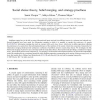Free Online Productivity Tools
i2Speak
i2Symbol
i2OCR
iTex2Img
iWeb2Print
iWeb2Shot
i2Type
iPdf2Split
iPdf2Merge
i2Bopomofo
i2Arabic
i2Style
i2Image
i2PDF
iLatex2Rtf
Sci2ools
105
click to vote
INFFUS
2006
2006
Social choice theory, belief merging, and strategy-proofness
Intelligent agents have to be able to merge informational inputs received from different sources in a coherent and rational way. Several proposals have been made for information merging in which it is possible to encode the preferences of sources [5,4,19,24,25,1]. Information merging has much in common with social choice theory, which aims to define operations reflecting the preferences of a society from the individual preferences of the members of the society. Given this connection, frameworks for information merging should provide satisfactory resolutions of problems raised in social choice theory. We investigate the link between the merging of epistemic states and some results in social choice theory. This is achieved by providing a consistent set of properties--akin to those used in Arrow
Related Content
| Added | 13 Dec 2010 |
| Updated | 13 Dec 2010 |
| Type | Journal |
| Year | 2006 |
| Where | INFFUS |
| Authors | Samir Chopra, Aditya K. Ghose, Thomas Andreas Meyer |
Comments (0)

